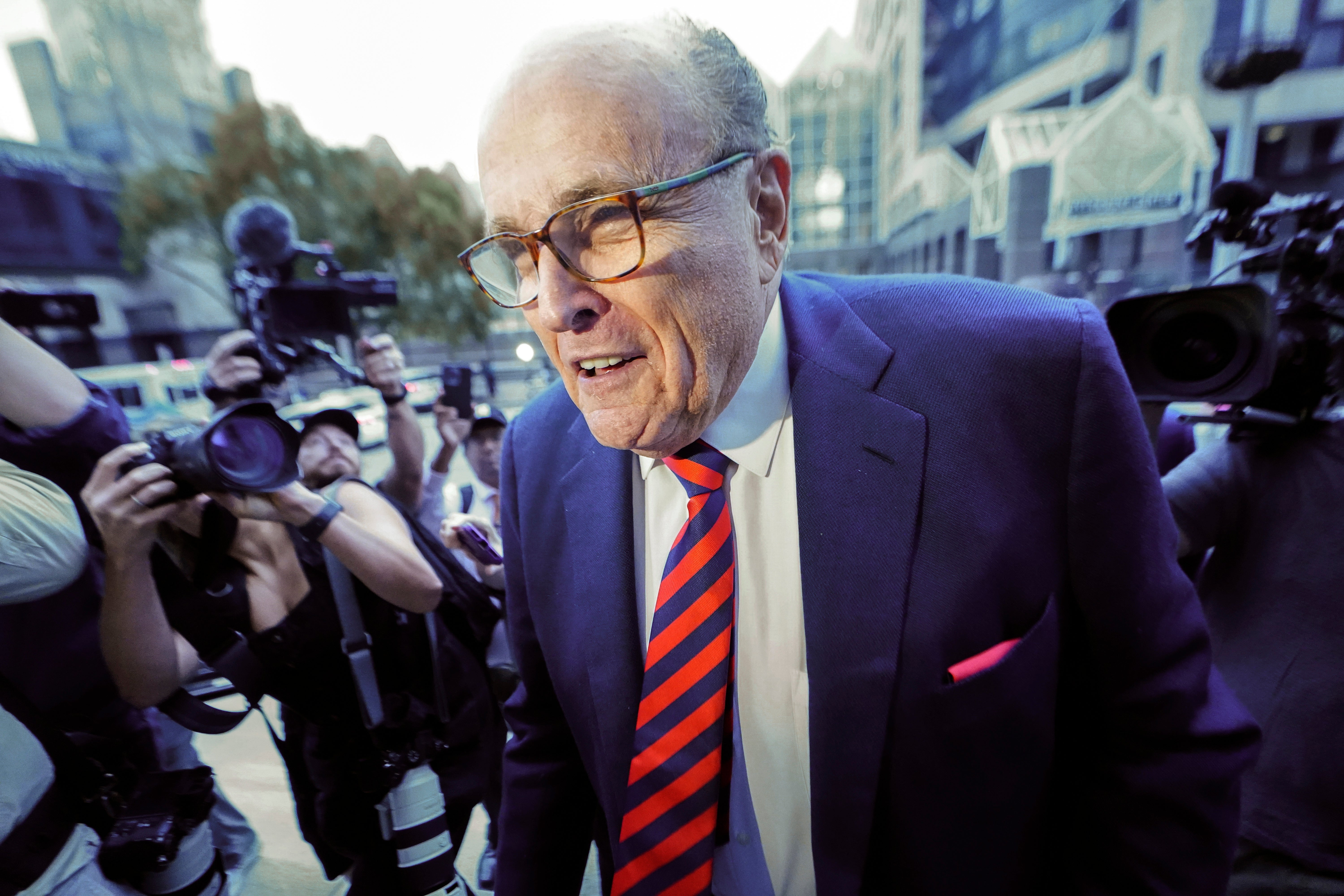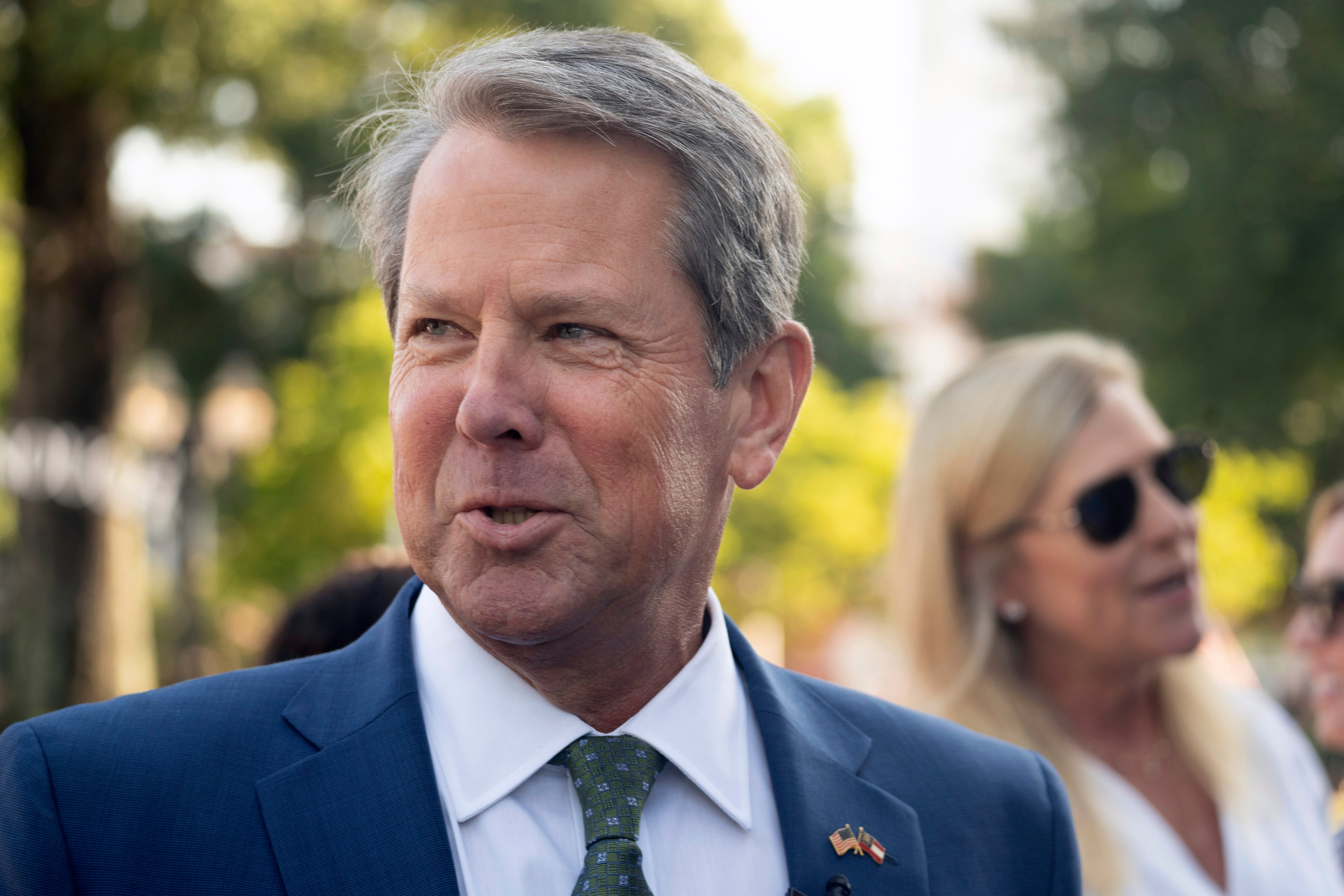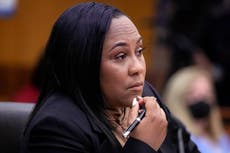Georgia grand jury recommends perjury indictments for Trump allies who lied in 2020 election probe
‘We find by unanimous vote that no widespread fraud took place in the Georgia 2020 presidential election that could result in overturning that election,’ report states
Your support helps us to tell the story
From reproductive rights to climate change to Big Tech, The Independent is on the ground when the story is developing. Whether it's investigating the financials of Elon Musk's pro-Trump PAC or producing our latest documentary, 'The A Word', which shines a light on the American women fighting for reproductive rights, we know how important it is to parse out the facts from the messaging.
At such a critical moment in US history, we need reporters on the ground. Your donation allows us to keep sending journalists to speak to both sides of the story.
The Independent is trusted by Americans across the entire political spectrum. And unlike many other quality news outlets, we choose not to lock Americans out of our reporting and analysis with paywalls. We believe quality journalism should be available to everyone, paid for by those who can afford it.
Your support makes all the difference.The Fulton County, Georgia, special grand jury investigating former president Donald Trump’s efforts to overturn his 2020 election loss to Joe Biden in the Peach State has recommended that perjury charges be brought against multiple witnesses who they found to have lied during their testimony.
Earlier in the week, Judge Robert McBurney ordered a partial version of the grand jury’s report – the report’s introduction, conclusion, and a section on the perjury allegations – to be made public, while keeping most of the report sealed for the time being to protect due process rights of witnesses and potential defendants.
In one of those released sections, made public on Thursday, grand jurors wrote that “a majority” of the memebrs believed that “perjury may have been committed by one or more” of the 75 witnesses who gave evidence during the investigation.
“The Grand Jury recommends that the District Attorney seek appropriate indictments for such crimes where the evidence is compelling,” they added.
Although it is not yet known which of the 75 witnesses who gave evidence before the panel are thought to have lied to the grand jury, many of the witnesses who could be subject to perjury charges are counted among Mr Trump’s closest aides and allies.
The grand jury heard testimony from Mr Trump’s former personal attorney, disgraced ex-New York City mayor Rudolph Giuliani, his former White House chief of staff, Mark Meadows, as well as other Trumpworld figures involved in Mr Trump’s push to overturn his loss in the weeks leading up to the January 6 attack on the Capitol.
One such witness, South Carolina Senator Lindsey Graham, engaged in a long court battle to block the subpoena before being ultimately compelled to testify before the grand jury.
Grand jurors also heard testimony from multiple Georgia elected officials, including Governor Brian Kemp and Secretary of State Brad Raffensperger.
In the introduction to their report, the grand jury stated that after hearing “extensive testimony on the subject of alleged election fraud from poll workers, investigators, technical experts, and State of Georgia employees and officials, as well as from persons still claiming that such fraud took place,” they unanimously voted to find that “no widespread fraud took place in the Georgia 2020 presidential election that could result in overturning that election”.
Judge McBurney on Monday ordered that the vast majority of the report remain sealed, including a list of individuals against whom the special purpose grand jury recommended indictments. But he also ordered the release of the three parts of the report that were made public on Thursday: The introduction and conclusion of the grand jury report, as well as the section detailing grand jurors’ concerns that multiple witnesses lied to the grand jury when testifying over the course of the investigation.

“Having reviewed the final report, the undersigned concludes that the special purpose grand jury did not exceed the scope of its prescribed mission. Indeed, it provided the District Attorney with exactly what she requested: a roster of who should (or should not) be indicted, and for what, in relation to the conduct (and aftermath) of the 2020 general election in Georgia,” he wrote, adding that on the surface, the law would require the report be published in its complete form.
Yet the judge said there are compelling reasons to keep parts of the report from the public at this time, writing: “But, as with many things in the law, it is not that simple”.
He added that due process requires that parts of the report detailing the names of potential targets for indictment remain secret for the time being, as well as portions identifying people named in the report who didn’t get to appear before the grand jury. But he stressed that those sections of the report won’t be kept secret forever.
“The consequence of these due process deficiencies is not that the special purpose grand jury's final report is forever suppressed or that its recommendations for or against indictment are in any way flawed or suspect. Rather, the consequence is that those recommendations are for the District Attorney's eyes only -for now,” he said.
Fulton County District Attorney Fani Willis began the grand jury investigation into election interference soon after the infamous 2 January 2021 call, in which Mr Trump asked Georgia Secretary of State Brad Raffensperger to “find” the votes needed for him to overturn an 11,000-vote deficit.
Over the course of about six months, the special grand jury has heard testimony from dozens of witnesses, including numerous close Trump associates and assorted high-ranking Georgia state officials. The case is among several around the country that threaten legal peril for the former president as he seeks a second term in 2024.
As grand jurors heard evidence from June 2022 through December 2022, it became clear that Ms Willis was focusing on several different areas: phone calls made to Georgia officials by Trump and his allies; false statements made by Trump associates before Georgia legislative committees; a panel of 16 Republicans who signed a certificate falsely stating that Trump had won the state and that they were the state’s “duly elected and qualified” electors; the abrupt resignation of the U.S. attorney in Atlanta in January 2021; alleged attempts to pressure a Fulton County election worker; and breaches of election equipment in a rural south Georgia county.

Special grand juries in Georgia cannot issue indictments but instead can issue a final report recommending actions to be taken. It is then up to the district attorney to decide whether to seek an indictment from a regular grand jury.
But a court hearing before Judge McBurney earlier this month, Ms Willis said "decisions are imminent" regarding whether she will seek indictments from a regular grand jury against people involved in Mr Trump’s push to reverse his loss to Mr Biden.
Throughout the investigation, she has repeatedly said she would go where the facts lead. It would be an extraordinary step if she chooses to bring charges against Trump himself, as no American president has ever faced criminal charges in any court of law.
As for who could face charges as a result of her investigation, the probe sought testimony from and about numerous allies of the twice-impeached ex-president, including Mr Giuliani, Mr Graham, Mr Meadows and former Trump national security adviser Michael Flynn, as well as John Eastman and other lawyers who participated in Trump's attempts to stay in power.
In a statement, a spokesperson for Mr Trump pointed out that the sections of the grand jury report released on Thursday “do not even mention [former] President Trump’s name” and “ have nothing to do with the [former] President because [former] President Trump did absolutely nothing wrong”.
“The President participated in two perfect phone calls regarding election integrity in Georgia, which he is entitled to do - in fact, as President, it was President Trump’s Constitutional duty to ensure election safety, security, and integrity,” they said.
With additional reporting by agencies
Subscribe to Independent Premium to bookmark this article
Want to bookmark your favourite articles and stories to read or reference later? Start your Independent Premium subscription today.




Join our commenting forum
Join thought-provoking conversations, follow other Independent readers and see their replies
Comments